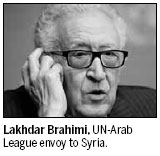Syria peace talks delayed by US-Russian divisions
The United States and Russia failed on Tuesday to agree on a date for a Syrian peace conference, remaining divided over Iran's indeterminate role in the talks and over who would represent Syria's opposition.
"We were hoping that we'd be in a position to announce a date today; unfortunately we're not," UN-Arab League envoy Lakhdar Brahimi told reporters in Geneva on Tuesday.
"But we're still hoping that we'll be able to have the conference before the end of the year," he said, adding that he would meet again with Russian and US officials on Nov 25.
His comments followed a day of intense discussions with senior diplomats from the world powers in Geneva aimed at preparing a new international conference to try to end the Syrian conflict.
But Tuesday's meeting ended without a date.
Pressed to reveal the main stumbling blocks, Brahimi cited divisions within the Syrian opposition, saying he hoped they would "move toward the formation of a credible delegation" for peace talks.
"That will be a big step forward to make the conference possible," the veteran international mediator said.
The main umbrella opposition, the National Coalition, has said it plans to meet in Istanbul on Saturday to decide whether to attend the peace talks.
But a key member of the bloc has threatened to quit if it decides to attend, and some rebels have warned that all participants will be deemed traitors.
The fate of President Bashar al-Assad is crucial to the opposition, which has insisted that his resignation be on the negotiating table - a demand rejected by Damascus.

A senior US official voiced optimism that the conference, dubbed Geneva II, could be held by the end of the year, but stressed the importance of giving the splintered opposition time to create a representative delegation.
"This is about building the future of Syria. That is a long, difficult, complicated process. If it takes the opposition coalition a few more weeks to prepare themselves in the way they feel they need to, ... we want to support them to do that," the official said, requesting anonymity.
Russia, a staunch ally of the Syrian regime, was meanwhile planning to meet with members of the Syrian opposition in Geneva on Wednesday, Deputy Foreign Minister Gennady Gatilov, who took part in Tuesday's talks, told Russian media.
US skepticism
The momentum for a new peace conference came after a landmark Russian-US accord was reached in September to destroy Syria's chemical arsenal by mid-2014.
The Russian-US agreement raised hopes that diplomatic efforts might also manage to coax the warring sides to hold talks later this month.
But on the same day as the discussions in Geneva, the US ambassador to the United Nations voiced "skepticism" over Syria's declaration of its chemical weapons to an international watchdog and said the US was checking its accuracy.
"More work of course remains to be done to ensure that the Syrian government's list of declared sites is comprehensive and that the process remains on track, particularly as we enter the destruction phase," said the US envoy, Samantha Power.
"We obviously bring skepticism born of years of dealing with this regime," she added.
Meanwhile, Saudi Arabia and Qatar, two major backers of the Syrian rebels, have stressed the need for a clear timetable for the conference.
Some 9.3 million people, or nearly half of the Syrian population, are now in need of humanitarian assistance while 6.5 million people have been displaced in Syria and some 2.2 million have fled the country, according to UN data.
AFP-Reuters
(China Daily 11/07/2013 page11)








